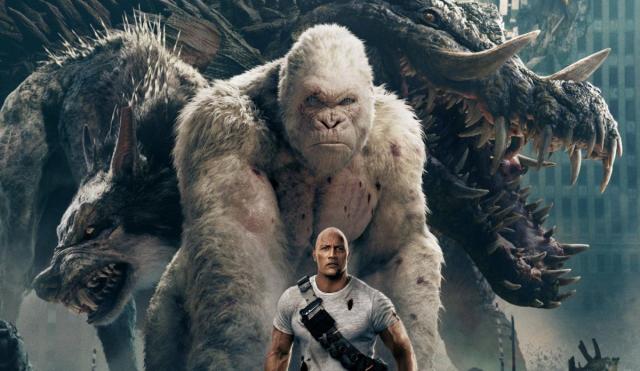Dwayne “The Rock” Johnson basically spoiled the ending to every movie he’ll ever make.
He knows his brand, and his audience. He’s not exactly aiming to fill Daniel Day-Lewis’ shoes. He’s an action hero, with an emphasis on hero, and he wants to save his audience from feeling bummed out.
Johnson has a new profile in Rolling Stone, sharing his philosophy when it comes to showing the audience a good time. A good time means no sad endings.
“No one’s going to see me play a borderline psychopath suffering from depression. I have friends I admire, Oscar winners, who approach our craft with the idea of ‘Sometimes it comes out a little darker, and nobody will see it, but it’s for me.’ Great. But I have other things I can do for me. I’m gonna take care of you, the audience. You pay your hard-earned money – I don’t need to bring my dark sh*t to you. Maybe a little – but if it’s in there, we’re gonna overcome it, and we’re gonna overcome it together.”
That philosophy almost led him to quit “Rampage” and tell them to get another actor for the role.
Mild SPOILER ALERT for “Rampage.”

“So the script comes in, and I’m reading it,” Johnson says. “And at the end of it – George dies! I’m like, ‘No. Did I miss something? George can’t be dead.’ But I go back, and yeah.”
Johnson says this moment became “the number-one topic of discussion” between himself, the director and producers, and the studio. “I don’t like a sad ending,” he says. “Life brings that sh*t – I don’t want it in my movies. When the credits roll, I want to feel great.” His concerns went up the chain of command, and “we had a big meeting where they gave me all the reasons they thought George should die,” he says. “He sacrifices himself saving the world. Killing these animals who had ill intentions to harm mankind. He sacrifices himself like a brave soldier. OK. But this is a movie! There’s a crocodile the size of a football stadium – we’re not making Saving Private Ryan.”
“Dwayne rarely digs in, but on this he was very adamant,” Flynn says. “It was back and forth for about two months.”
According to Johnson, it was about more than just George. “My problem is I have a relationship with an audience around the world,” he says. “For years I’ve built a trust with them that they’re gonna come to my movies and feel good. So every once in a while, you have to drop this card, which is: You’re gonna have to find another actor. We need to figure something out, otherwise I’m not gonna do the movie.”
In the end, they landed on a compromise that made both sides happy. But everyone agrees that Johnson had the right instinct. “He understands the audience and his relationship with the audience better than anyone,” Peyton says.
“That’s Dwayne’s genius,” says Flynn. “And watching it with an audience, he was 100 percent right.”
As Collider noted:
“This is incredibly fascinating insight into the ‘Dwayne Johnson Brand.’ … In an era where movie stars have been replaced by franchises and known IP, Johnson has keenly established a brand in which he himself is the IP—people come to Dwayne Johnson movies to see Dwayne Johnson. It doesn’t always work out, as evidenced by ‘Baywatch,’ but in addition to solid hits like ‘Central Intelligence’ you get something like ‘Jumanji: Welcome to the Jungle,’ which becomes a worldwide phenomenon.”
Many people do want to head to a popcorn movie for a good time, not a deep time. But audiences have proven from “Game of Thrones” to “Lord of the Rings” — and “Titanic,” once the highest-grossing movie in the world — that they are completely on board for big-budget movie/TV storylines that run the gamut of emotions from A to Z, not just A to B+.
But now we know that’s just not the Dwayne Johnson way, so you don’t have to worry that you’ll ever be bummed out by any of his action movies. Instead of comfort food, it’s comfort kick-ass.
“Rampage” is now in theaters.
.yahoo














